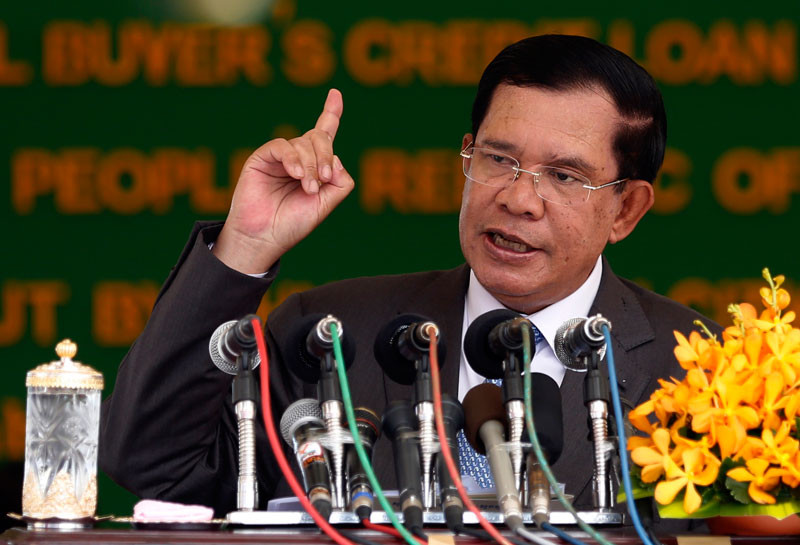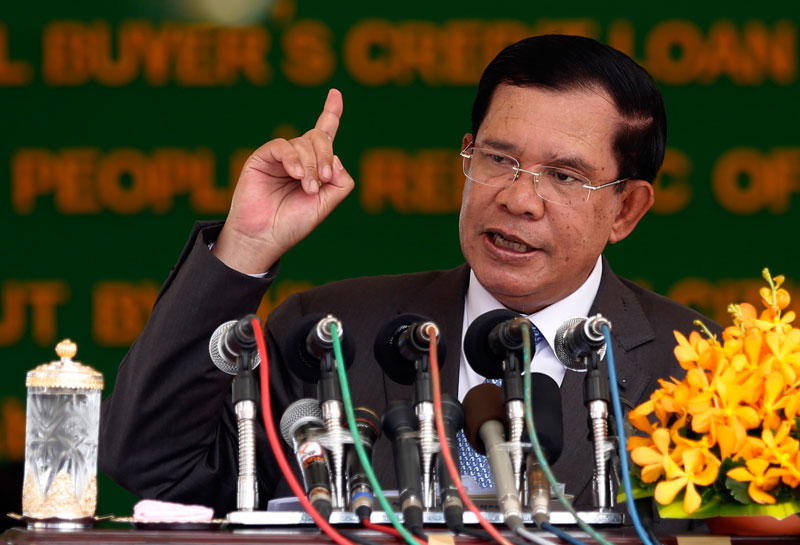Twenty-four years after the peace that ended Cambodia’s two decades of civil war, Prime Minister Hun Sen, one of the architects of the peace, has started beating the drum for the next war he says will tear the country apart.
With the message that peace can continue only on his terms, the prime minister has in the past month presaged massacres of Muslims, mutinies by the wealthy and the return of the Khmer Rouge if the CNRP wins the national election in 2018.
–News Analysis

The threats heightened last week when Mr. Hun Sen, apparently casting aside the pretensions of civilian government, foreshadowed rebellions by the CPP-aligned chiefs of the military and police under a CNRP regime.
“These groups will bring in their forces and react,” Mr. Hun Sen warned, musing about a newly-elected CNRP government attempting to replace the two commanders, who are members of the CPP standing committee.
“An internal war will erupt,” he said.
It was a once rare but now increasingly common acknowledgement from Mr. Hun Sen that his image of invincibility is facing its toughest test since 1997, when he called in the army to reassert itself against Funcinpec, ousting Prince Norodom Ranariddh from power.
Yet with the current backdrop of a political detente with an increasingly docile CNRP—seemingly confident that its brand and unprecedented unity alone can carry it to victory—Mr. Hun Sen ought to be enjoying the fruits of his 2013 victory.
“I don’t know why Hun Sen is so violent,” said David Chandler, a noted Cambodia historian, in an email yesterday, adding that Mr. Hun Sen’s latest warnings were evocative of a past volatile era.
“He seems to be unconsciously following a scenario set by Sihanouk in the 1960s, whereby overwork, runaway egotism, too many fawning cronies and too many real and imagined threats led the Prince to spin similarly out of control,” Mr. Chandler said.
Mr. Hun Sen’s recent warnings of war and a return of Khmer Rouge chaos has been focused in particular on opposition leader Sam Rainsy’s plans to create a tribunal to take back land that has been stolen by the rich and return it to the poor.
A policy likely to prove popular with the increasingly landless rural poor that once formed the CPP’s base, Mr. Hun Sen has provocatively suggested to the rich that the plan would be disastrous.
“If voted in, [the CNRP says] it will solve this and that, but I dare say that the men here are its enemies,” Mr. Hun Sen told businessmen attending a function last month. “So would there be peace?”
“All tycoons are its class enemies, and [the CNRP] would seize their hotels and give them to the poor,” the prime minister added. “Would it be peaceful?”
John Ciorciari, a Cambodia scholar at the University of Michigan’s Gerald R. Ford School of Public Policy, said such warnings could be dismissed as age-old electoral scare tactics—if it were not for Mr. Hun Sen’s violent history.
“It’s possible that Hun Sen’s warnings about an army backlash are electoral bluster, but given his past willingness to use force for political advantage, they have to be taken seriously,” Mr. Ciorciari wrote in an email.
“There’s a chance that the CPP will hand over power peacefully if it loses at the ballot box—authoritarian regimes sometimes do exit without a fight—but it would be rash to presume a handover would be peaceful,” he said.
“A greater degree of trust between Hun Sen and Sam Rainsy would raise—but not guarantee—the prospects of a peaceful transition if the CNRP wins. The same would be true of a pledge by CPP leaders to respect electoral outcomes.”
CPP spokesman Sok Eysan said his party would respect the results of the 2018 election, no matter what they are, but said the question was irrelevant to Mr. Hun Sen’s warnings that a CNRP victory would result in war.
“Whatever the result of the election, we will accept it,” Mr. Eysan said. “We respect election results…. The war that would happen would not be caused from the CPP losing the vote, but would be caused by CNRP policy.”
Along with Mr. Rainsy, Mr. Hun Sen has promoted a new “culture of dialogue” between the two leaders meant to usher in a more parliamentary style of political conflict and allow for elections without the threat of violence.
However, hopes that such a culture can take root have been fraying, with Mr. Rainsy in August questioning Mr. Hun Sen’s “trustworthiness and…sense of honour” and the premier again beating the war drum and calling the CNRP president “the leader of the thieves.”
Council of Ministers spokesman Phay Siphan said Mr. Hun Sen has only been explaining logical results of opposition policies when predicting war if a land tribunal is created, or if the CNRP replaces CPP stalwarts atop the police and military.
“Hun Sen only explains the policies of the CNRP. They have policies that say if they win the election, they will support the poor people getting rid of loans from the bank, and taking land from the rich,” Mr. Siphan said.
“All he is trying to explain is that they should abide by the law. If [Mr. Rainsy] would personally try to remove [army Commander] Pol Saroeun and the police chief, Neth Savoeun, and they don’t like that, there will be another conflict,” he added.
Mr. Rainsy did not respond to a request for comment yesterday, but the opposition leader has over the past year downplayed the CPP’s hand-in-glove relationship with the army, suggesting in January that the military might not defend a defeated CPP.
“The latest developments in several countries over the past five years is that there were some people, some regimes, who thought they were protected by the military, but thanks to a change in mentality, democracy prevailed,” Mr. Rainsy said.
Moreover, few of the elites entangled in the CPP’s business and military networks would be keen to return to the austere 1980s, when iron-fisted rule was coupled with a pariah status, said Ou Virak, founder of the Future Forum think tank.
“They are counting their accumulated wealth, their properties, their land, and they are getting used to their luxuries. I don’t think that many people in the CPP would accept too much long-lasting turmoil,” Mr. Virak said.
“The time when Cambodia was internationally isolated was not very comfortable for these people and they do not want to do that again. They could risk a coup, following Thailand as a model, but it would be a mistake,” he added. “Cambodia is not Thailand.”
Yet few believe that Mr. Hun Sen would step down without a fight. Mr. Chandler, the historian, was succinct when asked if there was any chance of a peaceful and uneventful transition if the CNRP does win in 2018.
“NO,” he wrote.
(Additional reporting by Mech Dara)




